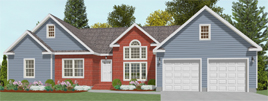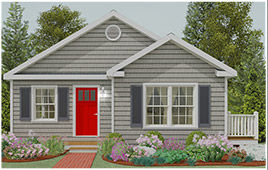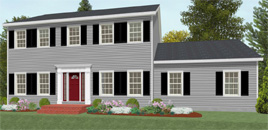CALL 888-764-1297
Magnificently Built Modular Homes
How much do modular homes cost?
As with stick built construction the cost of a modular home will vary depending on what you put in the home and the style of home you choose. Modular homes prices compare favorably with an equivalent site-built home.
 How long does it take to build a modular home?
How long does it take to build a modular home?
Generally, it is approximately 4 months to complete the typical modular home, from the time of final plans. This is, of course, a rough estimate. However, the timeframe can be shortened with various alterations.
Are modular homes built as well as stick built homes?
Talk with homeowners, inspectors and do the research and you will see that the answer to this question is a "YES!" Modular homes have around 30% more lumber which makes them strong enough to be lifted and moved by a crane. Modular homes are far more square and level than site built homes. There are numerous inspections during the construction process to ensure a quality finished home.
Can modular floor plans be customized?
Yes. There are standard floor plans of course, however, floor plans of each style home can be customized, as well as the amenities inside the home.
Is it hard to finance a modular home?
No. In fact, it's quite simple. Modular homes generally qualify for the same rates as site-built homes.
Does it cost more to insure a modular home?
No. A modular home will usually get the same insurance rates as a traditional site-built home.
If you have any additional questions, please feel free to call Avalon Building Systems. We are happy to help.
Many empty nesters are contemplating downsizing their homes. Of all the numerous reasons for downsizing, the most common is that the children have moved out. Perhaps you are looking to stay in or near the same community you have grown to love over the years, or perhaps you want to relocate to Cape Cod. Building a modular home may be a great choice for you. We have many styles and floor plans that will fit your needs. Also, building a modular home is cost effective, efficient and downsizing can save you tax dollars.
 A ranch style home, our favorite being the Deerfield, offers you the style you have grown accustomed to with a floor plan to match. With 1150 square feet, the Deerfield is a single story three bedroom and two bathroom house. The floor plan includes an open living, kitchen and dining area and is perfect for a narrow lot. It also has an option to add a front porch. With this ranch home you will still have the space you are used to and the room for visitors or grandchildren.
A ranch style home, our favorite being the Deerfield, offers you the style you have grown accustomed to with a floor plan to match. With 1150 square feet, the Deerfield is a single story three bedroom and two bathroom house. The floor plan includes an open living, kitchen and dining area and is perfect for a narrow lot. It also has an option to add a front porch. With this ranch home you will still have the space you are used to and the room for visitors or grandchildren.
If it is the waterfront that draws you, we have vacation home floor plans to suit your needs as well. The Wellfleet is a single story floor plan, 1120 square feet, with two bedrooms and a bathroom. This floor plan also offers an easily accessible laundry area right off the kitchen. The open space of the kitchen, dining and living areas make this floor plan a great vacation home. You can enjoy your new home in class and style.
Then of course, we have the traditional cape style home. Two of our cape style floor plans, the Barnstable (650 sq ft) and the Beverly (1245 sq ft), both offer unfinished upstairs to be molded into a space of your choosing. Both styles offer all the charm of a cape style home.
Feel free to ask us about any of these style homes or any other styles that we offer. And remember, at Avalon Building Systems, we can create the home you are looking for within the price parameters you require.
In order to buy a new home, the home must be appraised so you can begin the process of getting a mortgage or loan. An appraisal of a modular home is the estimated amount a home buyer can expect to pay for their new home. When buying any piece of property, including modular homes you need a licensed professional appraiser. However, if the home is not yet built, how is it actually appraised?
 The appraiser will inspect the modular home plans to have an idea of how much your new home should cost. Generally, they use information on labor rates, building costs, and depreciation and appreciation in the area where the property is being built. Also during the appraisal process, they will use sales comparisons, prices and values of compatible homes sold in the area, to determine the current modular home value.
The appraiser will inspect the modular home plans to have an idea of how much your new home should cost. Generally, they use information on labor rates, building costs, and depreciation and appreciation in the area where the property is being built. Also during the appraisal process, they will use sales comparisons, prices and values of compatible homes sold in the area, to determine the current modular home value.
Once a thorough analysis of the property has been completed, a report is created which is used to initiate the mortgage or loan process. Included in the report would be the property specifications, the replacement cost analysis and the comparative sales analysis.
The replacement cost analysis is total amount spent on the construction and the materials of the modular home, and the lot value. The comparative sales analysis, as mentioned, is the comparison of the actual property to other similar properties that have been sold in the same town or county.
These factors will determine the current total value of the property. The modular home appraisal will then be finalized so that the loan transaction can take place. The calculated total value of the modular home will help you determine future expenses such as utilities and real estate taxes.
Modular “SIPs” or Structural Insulated Panels were first designed by Avalon Building Systems. These panels are used in their modular homes. SIPs are prefabricated insulated sides of the modules which make up the walls, ceilings, floors, and roofs. They provide more superior and uniform insulation than stud or "stick frame" construction, with energy savings of 12%–14%. Because of their insulating qualities, SIPs also make the home quieter. These modular homes easily exceed "Energy Star Standards" and are certified to meet LEEDS platinum standards for new residential construction. LEED certification is based on a point system in which a building can obtain a Certified, Silver, Gold or Platinum level certification and is an internationally recognized certification system that measures how well a building performs in energy savings, water efficiency, CO2 emissions reduction, improved indoor air quality, and more.
Structural Insulated Panels are made in a factory and shipped to the manufacturing facilities. Manufacturers then connect them together to construct a house. When using SIPs, the speed of construction is much faster than stick built residential construction. Shells can be erected quickly, saving labor time and money, without compromising quality. These savings help compensate for the fact that SIPs usually cost more than other construction systems, but through the modular manufacturing process which is far more efficient than traditional construction, the overall costs are much lower, so the higher costs of SIPs are negated.
One of the many ways we serve you is to share the multitude of consumer "lessons learned" that we've compiled over the years. This blog post is a natural follow-on to the frequently asked questions that we have featured as a dedicated web page. At Avalon Building Systems, one of our top objectives is to NEVER hear you utter the words "We wish we would have....".
Whether you choose to build an economical Colonial Style modular home or a sprawling Ranch Style modular home, please consider the conclusions of those who have gone before you. They will help you to never look back:

Build floor joists at 12-in. on center versus the stick-built standard 16-in. The stability of the floor and feeling of structural rigidity are a simple thing and overlooked by most people. The additional cost is fairly small, but well worth it!
Nine foot ceiling heights. The feeling of expansiveness is great and the additional cost is value based.
Comfort height commodes. Size does matter and a few inches in height contributes to your comfort greatly, hence the term comfort height.
Upgraded door hardware and solid core doors. Again hollow core doors work just as well, but can't compare in imparting a feeling of quality.
Using a quiet floor system and gluing the wood flooring in place wherever possible.
Staggered 42-in. kitchen cabinetry.
Utilize 18-in. floor tile if the space allows. Again it is a small thing, and more difficult to install, but it's something you see up close each and every day. So prioritize quality here.
Upgrade the windows as nothing cheapens a house as skimping with cheap windows.
2-in. x 6-in. exterior framing. The energy savings created by the increased insulation cavity will pay for itself in no time.
Ample high hat recessed lighting. Again the showcase type effect is great and additional cost is minimal at construction.
Energy Star, Green or LEEDS Certification... the energy savings are truly amazing.
These are just a few tips on where to prioritize your new home budget. We will spend hours together with you on these and other subject when the time comes for your to build your dream home with us at Avalon Building Systems.
 The homes are obviously not built with bricks and mortar which take lots of time and labor. The material for the homes consists primarily of wood, steel, vinyl and weatherboard. Factory owners buy the material from their original manufacturers and suppliers at wholesale rates which are heavily discounted. We cut and mold the components and modules as per pre-set designs which reduces large amounts of waste that occurs at the individual home builder's sites. And left over material is never wasted; we use all of our material and help protect the planet by constructing homes this way. The factories transfer these savings to their customers to attract buyers in a competitive market. The savings to a buyer of a factory built home can be as large as 30% which bring your home within much easier reach.
The homes are obviously not built with bricks and mortar which take lots of time and labor. The material for the homes consists primarily of wood, steel, vinyl and weatherboard. Factory owners buy the material from their original manufacturers and suppliers at wholesale rates which are heavily discounted. We cut and mold the components and modules as per pre-set designs which reduces large amounts of waste that occurs at the individual home builder's sites. And left over material is never wasted; we use all of our material and help protect the planet by constructing homes this way. The factories transfer these savings to their customers to attract buyers in a competitive market. The savings to a buyer of a factory built home can be as large as 30% which bring your home within much easier reach. When looking through our selection of modular home plans, do not be misled by the pairing of modular home floor plans and exterior drawings into thinking that you cannot make adjustments. In fact, each of our floor plans for modular homes can have a multitude of exterior looks, and each exterior look can be applied to many different modular house floor plans. All of our standard modular home plans typically include a floor plan and an exterior elevation. The modular floor plans show the location and size of each room, while the elevations provide an idea of what the finished house will look like on the outside. You can adjust the slope of the roof, add dormers and decorative gables, and opt for over-sized roof overhangs if you choose, regardless of what you see in the drawing. There are a multitude of additional items you can add to your modular home.
When looking through our selection of modular home plans, do not be misled by the pairing of modular home floor plans and exterior drawings into thinking that you cannot make adjustments. In fact, each of our floor plans for modular homes can have a multitude of exterior looks, and each exterior look can be applied to many different modular house floor plans. All of our standard modular home plans typically include a floor plan and an exterior elevation. The modular floor plans show the location and size of each room, while the elevations provide an idea of what the finished house will look like on the outside. You can adjust the slope of the roof, add dormers and decorative gables, and opt for over-sized roof overhangs if you choose, regardless of what you see in the drawing. There are a multitude of additional items you can add to your modular home.Green building, or construction that is environmentally responsible, is becoming increasingly popular as more and more people have become conscious of the impact that construction has on the environment, both while the structure is being built, and for years afterward. Homeowners who wish to build a green home are to be commended for making the commitment to construction that works in harmony with the environment. However, for those in rural areas or smaller markets, finding both the materials to build a green home, and contractors who are familiar with green building techniques can be a challenge.

Modular homes can be an excellent solution for homeowners who find it difficult to build green with local materials and builders. Not only are modular homes as attractive both in appearance and in financial terms as traditionally-built homes, but they offer just as many customization options; everything from the floor plan to the green building plan can be chosen specifically by the homeowner.
Unlike traditionally-built homes, modular homes are by design an environmentally conscious choice. From the ground up, a modular home’s impact on the environment is smaller than that of a traditional home. The home site isn’t the only aspect of the modular home that ups its green factor. The construction process of a modular home is much less wasteful – and has a smaller environmental impact – than that of a traditionally-built home. Be sure to contact us today to learn more about modular homes and our green efforts in building safer and more eco-friendly homes.
 We offer many different floor plans for you to choose from or we can build a custom design home for you. With our integrated SIP panel technology, building sturdy, reliable homes is what we have to offer for all of our valued customers. We also offer a vast array of information regarding modular technology and its benefits.When decided for a modular home please consider the following:
We offer many different floor plans for you to choose from or we can build a custom design home for you. With our integrated SIP panel technology, building sturdy, reliable homes is what we have to offer for all of our valued customers. We also offer a vast array of information regarding modular technology and its benefits.When decided for a modular home please consider the following:HOME | COMMERCIAL | RESIDENTIAL | MODULAR BENEFITS | FLOOR PLANS | GALLERY | FINANCIAL INFO | TESTIMONIALS | ABOUT | CONTACT | BLOG | SITE MAP